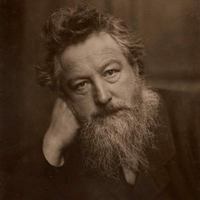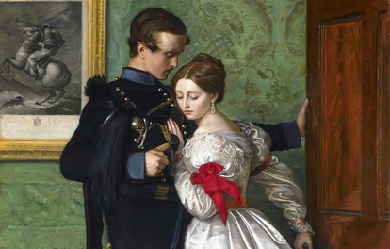Mother and Son
Now sleeps the land of houses,
and dead night holds the street,
And there thou liest, my baby,
and sleepest soft and sweet;
My man is away for awhile,
but safe and alone we lie,
And none heareth thy breath but thy mother,
and the moon looking down from the sky
On the weary waste of the town,
as it looked on the grass-edged road
Still warm with yesterday’s sun,
when I left my old abode;
Hand in hand with my love,
that night of all nights in the year;
When the river of love o’erflowed
and drowned all doubt and fear,
And we two were alone in the world,
and once if never again,
We knew of the secret of earth
and the tale of its labour and pain.
Lo amidst London I lift thee,
and how little and light thou art,
And thou without hope or fear
thou fear and hope of my heart!
Lo here thy body beginning,
O son, and thy soul and thy life;
But how will it be if thou livest,
and enterest into the strife,
And in love we dwell together
when the man is grown in thee,
When thy sweet speech I shall hearken,
and yet ’twixt thee and me
Shall rise that wall of distance,
that round each one doth grow,
And maketh it hard and bitter
each other’s thought to know.
Now, therefore, while yet thou art little
and hast no thought of thine own,
I will tell thee a word of the world;
of the hope whence thou hast grown;
Of the love that once begat thee,
of the sorrow that hath made
Thy little heart of hunger,
and thy hands on my bosom laid.
Then mayst thou remember hereafter,
as whiles when people say
All this hath happened before
in the life of another day;
So mayst thou dimly remember
this tale of thy mother’s voice,
As oft in the calm of dawning
I have heard the birds rejoice,
As oft I have heard the storm-wind
go moaning through the wood;
And I knew that earth was speaking,
and the mother’s voice was good.
Now, to thee alone will I tell it
that thy mother’s body is fair,
In the guise of the country maidens
Who play with the sun and the air;
Who have stood in the row of the reapers
in the August afternoon,
Who have sat by the frozen water
in the high day of the moon,
When the lights of the Christmas feasting
were dead in the house on the hill,
And the wild geese gone to the salt-marsh
had left the winter still.
Yea, I am fair, my firstling;
if thou couldst but remember me!
The hair that thy small hand clutcheth
is a goodly sight to see;
I am true, but my face is a snare;
soft and deep are my eyes,
And they seem for men’s beguiling
fulfilled with the dreams of the wise.
Kind are my lips, and they look
as though my soul had learned
Deep things I have never heard of,
my face and my hands are burned
By the lovely sun of the acres;
three months of London town
And thy birth-bed have bleached them indeed,
“But lo, where the edge of the gown”
(So said thy father) “is parting
the wrist that is white as the curd
From the brown of the hand that I love,
bright as the wing of a bird.”
Such is thy mother, O firstling,
yet strong as the maidens of old,
Whose spears and whose swords were the warders
of homestead, of field and of fold.
Oft were my feet on the highway,
often they wearied the grass;
From dusk unto dusk of the summer
three times in a week would I pass
To the downs from the house on the river
through the waves of the blossoming corn.
Fair then I lay down in the even,
and fresh I arose on the morn,
And scarce in the noon was I weary.
Ah, son, in the days of thy strife,
If thy soul could but harbour a dream
of the blossom of my life!
It would be as the sunlit meadows
beheld from a tossing sea,
And thy soul should look on a vision
of the peace that is to be.
Yet, yet the tears on my cheek!
and what is this doth move
My heart to thy heart, beloved,
save the flood of yearning love?
For fair and fierce is thy father,
and soft and strange are his eyes
That look on the days that shall be
with the hope of the brave and the wise.
It was many a day that we laughed,
as over the meadows we walked,
And many a day I hearkened
and the pictures came as he talked;
It was many a day that we longed,
and we lingered late at eve
Ere speech from speech was sundered,
and my hand his hand could leave.
Then I wept when I was alone,
and I longed till the daylight came;
And down the stairs I stole,
and there was our housekeeping dame
(No mother of me, the foundling)
kindling the fire betimes
Ere the haymaking folk went forth
to the meadows down by the limes;
All things I saw at a glance;
the quickening fire-tongues leapt
Through the crackling heap of sticks,
and the sweet smoke up from it crept,
And close to the very hearth
the low sun flooded the floor,
And the cat and her kittens played
in the sun by the open door.
The garden was fair in the morning,
and there in the road he stood
Beyond the crimson daisies
and the bush of southernwood.
Then side by side together
through the grey-walled place we went,
And O the fear departed,
and the rest and sweet content!
Son, sorrow and wisdom he taught me,
and sore I grieved and learned
As we twain grew into one;
and the heart within me burned
With the very hopes of his heart.
Ah, son, it is piteous,
But never again in my life
shall I dare to speak to thee thus;
So may these lonely words
about thee creep and cling,
These words of the lonely night
in the days of our wayfaring.
Many a child of woman
to-night is born in the town,
The desert of folly and wrong;
and of what and whence are they grown?
Many and many an one
of wont and use is born;
For a husband is taken to bed
as a hat or a ribbon is worn.
Prudence begets her thousands;
“good is a housekeeper’s life,
So shall I sell my body
that I may be matron and wife.”
“And I shall endure foul wedlock
and bear the children of need.”
Some are there born of hate,
many the children of greed.
“I, I too can be wedded,
though thou my love hast got.”
“I am fair and hard of heart,
and riches shall be my lot.”
And all these are the good and the happy,
on whom the world dawns fair.
O son, when wilt thou learn
of those that are born of despair,
As the fabled mud of the Nile
that quickens under the sun
With a growth of creeping things,
half dead when just begun?
E’en such is the care of Nature
that man should never die,
Though she breed of the fools of the earth,
and the dregs of the city sty.
But thou, O son, O son,
of very love wert born,
When our hope fulfilled bred hope,
and fear was a folly outworn.
On the eve of the toil and the battle
all sorrow and grief we weighed,
We hoped and we were not ashamed,
we knew and we were not afraid.
Now waneth the night and the moon;
ah, son, it is piteous
That never again in my life
shall I dare to speak to thee thus.
But sure from the wise and the simple
shall the mighty come to birth;
And fair were my fate, beloved,
if I be yet on the earth
When the world is awaken at last,
and from mouth to mouth they tell
Of thy love and thy deeds and thy valour,
and thy hope that nought can quell.


